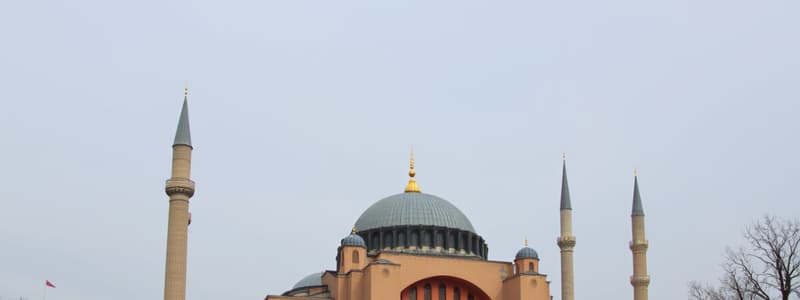Podcast
Questions and Answers
Why was Constantinople so hard to conquer?
Why was Constantinople so hard to conquer?
Surrounded by water and had two walls for protection
What are the two walls called in order from the coast?
What are the two walls called in order from the coast?
Wall of Constantine, Wall of Theodosius
What land form was the city on?
What land form was the city on?
A peninsula
What three bodies surrounded the city?
What three bodies surrounded the city?
How can you tell the city grew over time?
How can you tell the city grew over time?
How would armies try to attack a city with walls BEFORE gunpowder?
How would armies try to attack a city with walls BEFORE gunpowder?
What could Constantinople have done to improve their defenses AFTER the invention of gunpowder?
What could Constantinople have done to improve their defenses AFTER the invention of gunpowder?
What elements of the Hagia Sophia are classical legacies?
What elements of the Hagia Sophia are classical legacies?
After the building became a mosque, what was the feature that was added?
After the building became a mosque, what was the feature that was added?
What is a mosaic?
What is a mosaic?
How is the Byzantine mosaic different from a Roman mosaic?
How is the Byzantine mosaic different from a Roman mosaic?
Which emperor built Constantinople?
Which emperor built Constantinople?
Which emperor built the Hagia Sophia?
Which emperor built the Hagia Sophia?
What did Constantine and Justinian I practice?
What did Constantine and Justinian I practice?
What does Hagia Sophia mean?
What does Hagia Sophia mean?
Flashcards are hidden until you start studying
Study Notes
Constantinople: An Indomitable City
- Constantinople's strategic location made it difficult to conquer, surrounded by water and fortified with two massive walls.
- The two protective walls are known as the Wall of Constantine and the Wall of Theodosius.
- The city is situated on a peninsula, enhancing its defensive capabilities.
Geographic Features
- Constantinople is bordered by three significant bodies of water: the Sea of Marmara, the Bosporus Strait, and the Golden Horn.
Urban Expansion
- Evidence of the city's growth over time is reflected in the construction of two distinct walls, indicating expansion from East to West.
Military Tactics Pre-Gunpowder
- Prior to the invention of gunpowder, attacking armies employed tactics such as climbing walls, tunneling underneath, maneuvering around defenses, or using projectiles like arrows.
Adaptation to Gunpowder Warfare
- To bolster defenses against gunpowder artillery, Constantinople could have integrated cannons into their walls.
Architectural Marvel: Hagia Sophia
- Classical legacies observed in Hagia Sophia include its iconic dome shape and use of arches, representing advanced architectural techniques.
Features Added Post-Conversion
- Following its transformation into a mosque, minarets with balconies for prayer calls were added to Hagia Sophia.
Understanding Mosaics
- A mosaic is defined as an artistic representation created using colored glass or ceramic tiles.
- Byzantine mosaics differ from Roman mosaics by focusing less on daily life and more on religious and symbolic themes.
Historical Figures
- Constantinople was established by Emperor Constantine, who played a pivotal role in its creation.
- Hagia Sophia was commissioned by Emperor Justinian I, a significant figure in Byzantine architecture and culture.
Religious Context
- Both Constantine and Justinian I were practitioners of Christianity, influencing the religious landscape of their time.
Meaning of Hagia Sophia
- The term "Hagia Sophia" translates to "Holy Wisdom," reflecting its spiritual significance.
Studying That Suits You
Use AI to generate personalized quizzes and flashcards to suit your learning preferences.



